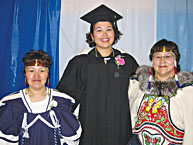Northern grads of McGill
When Lucy Mary Qavvik and Isabel Takatak graduated in education last May, they had this to say to the Nunatsiaq News: "We comforted each other and helped each other." Unusual words, perhaps, from the two class valedictorians, but understandable, given the context. Qavvik and Takatak were among seven Sanikiluaq women to finish the four years of study that now qualifies them to teach elementary school.

Left to right: Saa Pitsiulak, Nunavut Arctic College instructor, B.Ed. 1992; Neevee Hanson, current B.Ed. graduate; Ooloota Maatiusi, Principal of Nunavut Teacher Education Program, B.Ed. 1994
"It seemed like it went on forever," they continued to the Nunavut, bilingual (English-Inuktitut) weekly, and that feeling may be understood given that these women, most of them mothers to many children, one of them a grandmother, have busy lives to begin with. Add to that the stresses of homework, computer problems, little money and completing a McGill certificate in education or bachelor of education begins to look a little arduous.
Still, it's something they don't regret doing for a minute. "We want to be role models -- the best teachers we can be," they both told the paper. Judging from the celebration offered by the community, they and their fellow graduates are already appreciated. The feast featured frozen caribou, Arctic char, mussels, scallops, shrimps and bannock. But the pinnacle of the meal, reported Valentina de Krom, director of McGill's Office of First Nations and Inuit Education, were the graduation cakes.
"Each class from the elementary school made a cake," she said, from her office in the education building. "It was very sweet."
What is also very sweet is that with more and more Inuit graduating from the program -- and their numbers now total 300 -- more and more Inuit children are being taught in their mother tongue. "Now, from kindergarten to grade three, the children are taught in Inuktitut," says de Krom.
Before McGill began working in the north in 1983 with what became the Nunavut Teacher Education Program (NTEP), however, almost all the teachers were non-Inuit. "It was all southerners teaching children who didn't understand a word of English and there are still places in the north where children come to school with only their mother tongue."
Now, NTEP hires its own instructors, sets up its own classrooms and turns to McGill only for occasional assistance in finding instructors, says de Krom, who taught for nine years in the North.
"We go to the graduations and do periodic site visits," says de Krom who attended the convocations ceremonies both in Sanikiluaq, a community of 700, comprising the Belcher islands in Hudson Bay, and in Iqaluit, on Baffin Island, the capital of Nunavut with a population of 6,000. This year, the dean of education, Roger Slee, accompanied her to Iqaluit, at the Nunavut Arctic College, where the teachers trained.
For Slee, an Australian, the experience was a particular pleasure. "I have been to many convocations as a dean of education yet the ceremony in the north will stay at the front of my memory for a long time to come. Why? It was a genuine celebration of community. People accepted certificates for degrees and for trade qualifications -- all of which are vital for the development of economic and social capital in the North," he wrote in an email to The Reporter.
Slee would like to remind the university of the important work that has been accomplished by the Faculty of Education,
"The McGill community may not be fully cognizant of the wonderful educational and cultural work that is being done through our First Nations and Inuit teacher education programmes. The reclaiming of educational capacity by these communities is critical and McGill has contributed to this project of building a polyethnic Canada for new times."
